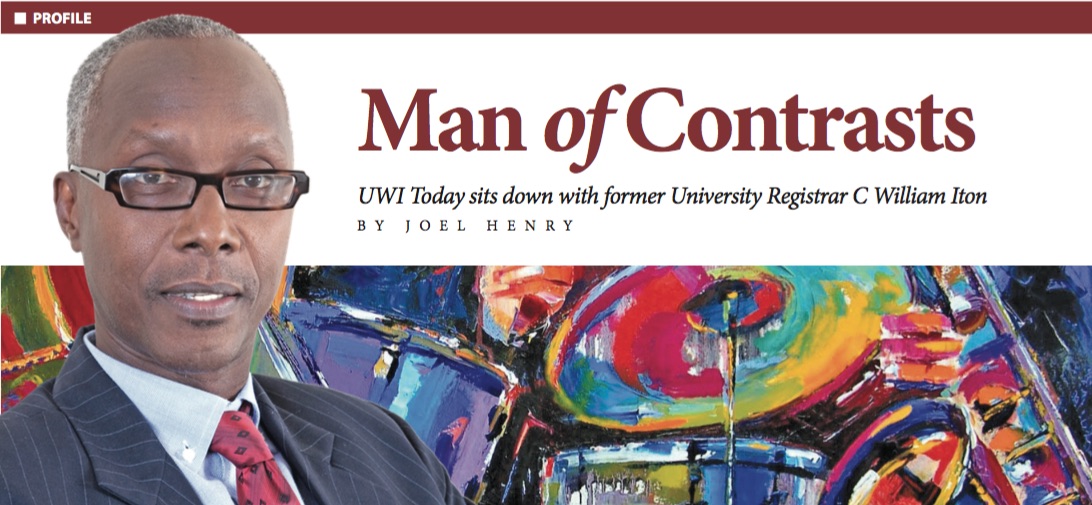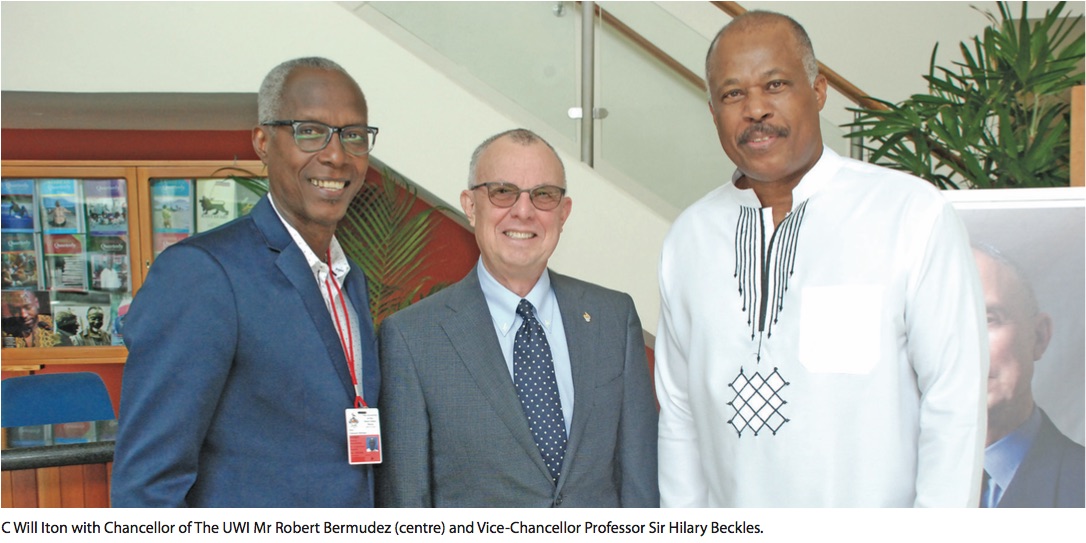
“When I came [to UWI St Augustine] I was still young. I wasn’t as mature. I didn’t understand that both sides have to win.”
C William Iton, the former Registrar of The University of the West Indies (UWI), recounts the story of his early days in industrial relations at the St Augustine Campus.
Even though the “sides” he was referring to were employer and workers, he might as well have been talking about himself. Iton, or “Will” as he has become known to the cross-campus community, is multifaceted, almost to the point of seeming contradictory.
Lean and with a penchant for buttoned-down shirts, he looks more like a former musician than one of the most senior of academic administrators. He held the post of UWI St Augustine Campus Registrar for five years starting in 1999, and retired from the position of overall University Registrar in 2019. Dr Maurice Smith, the current University Registrar, was interviewed in the last issue of UWI Today (https://sta.uwi.edu/uwitoday/article7.asp).
Yet what seems most contradictory about Iton is his essence. Outwardly, he fits the prevailing stereotype of old school masculinity - until you hear him speak. In his words, and throughout his career, he is focussed on empathy, compassion and connection to people.
“My best moments,” he says of his time at UWI, “have to do with the people I met and the people I helped.”
At the time of our interview, Iton was in Trinidad and Tobago for the 2020 Carnival season. His retirement from UWI, he says, has been very good.
“I knew that the day would come when I’m no longer University Registrar,” he remarks, “so I was always psychologically and emotionally prepared, and it’s been great.”
He has been able to spend more time with family, including his young children. When recounting his 37 years at UWI – relationships are the waypoints in his story. Whether it be his parents, who first carried the family to Guyana from their native Saint Vincent when he was in his early teens, thus introducing him to the wider region; his elder brother Andre Iton, who went to UWI Mona in Jamaica before him; or his twin brother C Wainwright "Wain" Iton, who is one of the closest people in his life.
“My twin brother Wain and I are extremely close,” he says.
Close as well are his chief mentors, the late Jamaican scholar and UWI Vice-Chancellor Professor Rex Nettleford, who introduced him to the trade union movement; and government minister and trade union leader Carlisle Dunkley (who passed in 2017). Still a very young man and recent UWI graduate at the time, Iton says the experience of being a member of Jamaica’s powerful National Workers’ Union transformed him.

“Being a trade unionist showed me what it is to stand up for those who are not accorded the dignity they should have. It led me to where I ultimately went.”
Trinidad and Tobago, he said, has a very large carbon footprint considering its relatively small population. “We produce the world’s second highest emissions per capita, but the work of NGC and UWI underscores that this country can contribute to rescue efforts to save the world.”
Among his destinations was UWI St Augustine, where he became the Head of Industrial Relations before eventually becoming Campus Registrar in 1999. Although he says Trinidad and Tobago (along with Jamaica) has a special place in his heart, his time at St Augustine had challenges; in particular what he calls the “Mother of All Strikes” in 1998 between the campus administration, headed by then Principal Professor Compton Bourne and the workers, represented by the Oilfields Workers’ Trade Union.
“It wasn’t a tea party. It was war,” remembers Iton.
For three months the workers were on strike, setting up camp outside of the campus grounds because they were locked out. There was vandalism, death threats and even the bombing of Professor Bourne’s home. Even though he had strong relationships with campus employees, Iton led like a general. The battle, which eventually involved the police and army, ultimately ended in the Campus’ favour.
The advantage he had, Iton says, is his firm understanding of the Industrial Relations Act and IR practices in Trinidad and Tobago. He fought hard, but not with animosity:
“It was awful. But you had to be strong. I was the principal target but there was no personal malice. I was doing my job.”
His recollection of this tense time is yet another contradiction. “It wasn’t one of the best times in my career, but I would say I was at my best,” he says.
After stints outside of UWI, including another IR post at TSTT, he took up the University Registrar’s position in 2007. Unsurprisingly, his vision for the post was to use it to uplift the workers.
“I wanted to make the university a more caring place,” he says. It was a people-centred model, shaped by the lifelong influence of several personal development thinkers and writers.
Currently, he is studying the work of Genos International, an Australian group that focuses on emotional intelligence.
“Leaders are learners,” he says. “I’m not sure if leaders understand how central the awareness of how we impact others is. Most of our leaders don’t appreciate how they show up.”
And they should show up, Iton says with compassion:
“The university has been good to me. The university is the amalgamation of good faculty, good students, and good workers. So, we have to come together as a community. But most importantly, we need to become a more caring and a kinder organisation. Once we take care of our people, everything will be alright.”